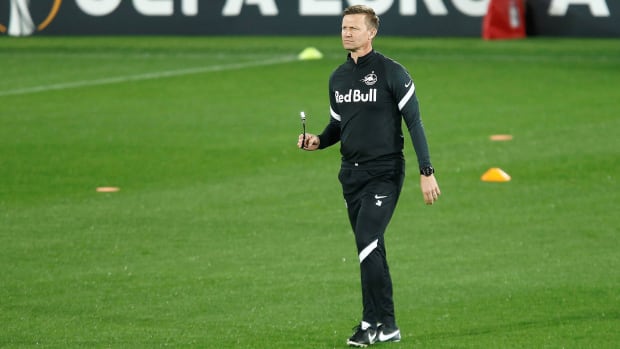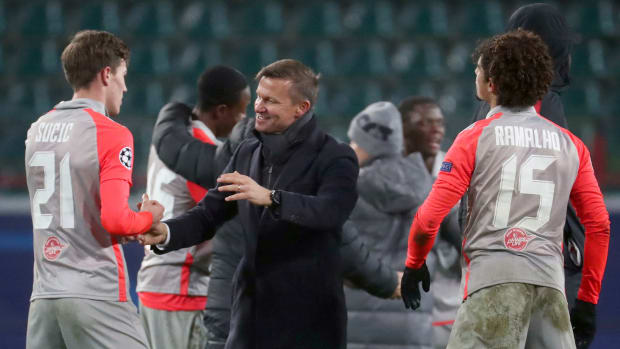While U.S. players are breaking glass ceilings in Europe, coaches still have a ways to climb, but no one has positioned himself better than RB Leipzig's new manager, Jesse Marsch.
It would have been fitting if Neil Armstrong were still alive and available to break the news.
Jesse Marsch’s managerial move from Austrian champion Red Bull Salzburg to German contender RB Leipzig is, in several ways, a small step. He’ll be working for the same bosses at the same company, wearing an almost identical logo and coaching a similar style of play. Marsch won’t even have to study a new language.
In other potentially historic ways, however, Thursday's announcement represents a giant leap for the U.S. game. It has been a season-plus of breakthroughs by U.S. players in Europe, many of whom have started to set new standards for Americans abroad. Christian Pulisic, Tyler Adams, Weston McKennie and their compatriots are redefining what’s possible. They’re proving to the powers that be that Americans can play the game at the highest level.
Convincing them that U.S. players know the game, however, has been tougher. U.S. coaches remain largely sidelined by skepticism, inertia and the lack of an established pathway to Europe’s top leagues. Bob Bradley got his chance toward the end of 2016 at U.S.-owned Swansea City, but he was saddled with a struggling team and overwhelmed by doubters from the start. He used funny but intolerable phrases like “road game” and had American mannerisms, and when Swansea lost three Premier League matches in a row that December, he was gone. Bradley lasted 11 games. The benefit of the doubt had been less than zero.
David Wagner (formerly of Huddersfield Town and Schalke 04) and Pellegrino Matarazzo (VfB Stuttgart) have managed in Europe’s “big five” leagues, but neither developed as coaches in the USA. Wagner, whose father is American, was born in Frankfurt and has spent his entire life in Europe. Matarazzo, who’s from New Jersey, has been in Germany for more than 20 years and got into coaching after spending a decade playing in the country’s lower tiers. He rose through the German ranks.

Marsch is U.S. born and bred, and so, like Bradley, he’s vying to be considered an exception to what’s felt like a couple of almost ironclad rules: U.S. players don’t understand soccer, and they can’t lead or inspire a European locker room. It has taken years to forge a players’ pathway to Europe, and it’s still somewhat tenuous. Delivering a U.S. coach to a club like RB Leipzig, which was a Champions League semifinalist in 2020, always was going to require something a bit more novel—something that would cut through the skepticism and insulate a coach while he grew accustomed to the European game.
Enter Red Bull. Bemoan New York's status as the secondary appendage of a global soccer conglomerate all you like, but without the MLS team’s ties to Austria and Germany, Marsch never steps foot on a path that leads toward the top of the Bundesliga. After his 2012 departure from the Montreal Impact (reportedly by mutual consent), Marsch was hired by New York in the wake of the sudden dismissal of fan favorite Mike Petke. It was a moment of inflection for the club and its supporters and an opportunity for Marsch to prove himself in a skeptical environment. He blossomed, mastering Red Bull’s system of play while leading the team to the MLS Supporters’ Shield in 2015. Marsch also shepherded Adams from the club’s USL Championship side to the first team, helping him become the elite midfielder who’d make his own way to Leipzig in 2019.
Red Bull’s teams are closely integrated, and Marsch had earned the trust of his colleagues and passed every audition. He trusted them in return, electing to leave New York in the summer of 2018 for an assistant’s role in Leipzig. It was a step back in seniority that prepared him for a subsequent leap forward. When Marco Rose departed Salzburg for Borussia Mönchengladbach in the summer of 2019, Marsch stepped in as the seamless replacement.
“Pedigree still matters a lot to people in Europe,” Marsch told The Guardian in 2019. “A year in the Bundesliga as an assistant and working under Ralf Rangnick gave me a little bit more to put in my back pocket to go into the next job. It has helped me be better at my job, but it’s also helped the perception of me here.”
Salzburg was already an Austrian juggernaut, having won six consecutive league championships before Marsch arrived. But there was still plenty to prove. This was a head coaching gig in Europe. The dressing room would be his. The expectations and standards were high, and the Champions League beckoned.
“My goal was to assimilate, to be myself, but to also honor the culture that I’m working in,” he told The Guardian.
Marsch once again aced his exams, winning the domestic double with Salzburg, unleashing Erling Haaland on Europe and giving Liverpool and Napoli all they could handle in the continent’s biggest competition.
“I couldn't have more respect for what Salzburg are doing here, the way they play football,” Liverpool manager Jürgen Klopp said following the second game between the clubs. “Massive respect for Jesse and what they did.”

That respect seems to have spread a bit throughout Europe. Marsch was linked to Borussia Dortmund over the winter, to Celtic last month and to Tottenham Hotspur this week. Whether or not those connections were legitimate, seeing an American’s name mentioned in those reports represents a big step. But Leipzig always was his most logical destination. Every Red Bull team is a feeder team—and like every German side, RB Leipzig supplies Bayern Munich. When Julian Nagelsmann announced on Tuesday his intention to take over the German champions this summer, Marsch immediately was listed among the favorites to succeed him in Leipzig. The confirmation came quickly. Marsch's two-year contract begins July 1.
It’ll be the most significant, high-profile test ever faced by a U.S. coach at the club level. And Marsch’s performance could have a lasting impact on the width of that transatlantic managerial pathway. He needed Red Bull to help blaze the trail, but now he’ll rise or fall on his own merit. He’ll be at the apex of the Red Bull pyramid, where results matter as much or more than development. He seems ready. He’s proven himself at every stop, and he’ll have the organization’s best players and resources at his disposal—along with the pressure that comes with Champions League expectations.
"I love football—training, tactics, all of it,” Marsch told the BBC last month. “But people and relationships is what really makes me tick. And ultimately if you were to ask me why I came to Europe, it was to see if my idea of relationships and leadership could function in the most competitive environment in our sport.”
His command of training, tactics and building relationships has taken him to the top at Red Bull, and further than any U.S. coach has gone before. Now he’ll really see if his ideas will work at the highest level, while the rest of the world gets its first look at an American doing the same.
More U.S. Soccer Coverage: